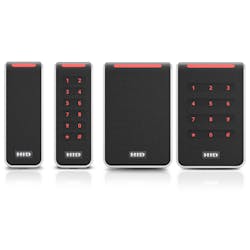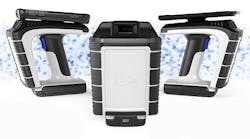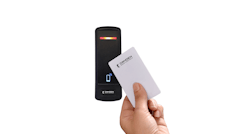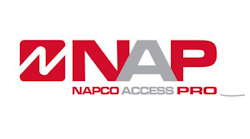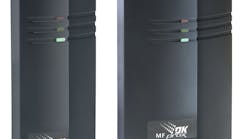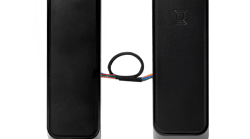When it was introduced at ISC West in 2002, HID’s iClass read/write contactless radio-frequency ID technology was a state-of-the-art encrypted access control card that had a variety of other applications, from time and attendance to digital cash transactions. For the past 18 years, the iClass card technology — in its various iterations — served as the standard for secure access control and a flexible option for other smart-card functions.
Unfortunately, the coming-out party for HID’s latest and most innovative access control card reader to date was delayed because of the COVID-19 pandemic, so the public rollout of HID’s Signo readers, the heir apparent to the ubiquitous iClass line, came a little later than anticipated.
Reader Makes Debut
HID expects the Signo reader to create an industry benchmark for adaptability, interoperability and security for years to come in the access control market. Add to the equation that it promises to be easy to use for customers and easy to install. It’s easy to see why HID executives, such as Stephen Carney, were giddy with excitement before the product hit the shelves.
“It’s something that we’ve been working on for quite a while,” says Carney, vice president of product marketing for physical access control at HID Global. “We’re very proud of it. We’re really looking forward to this as the next flagship line of readers, and we will continue to build it out. Later in the year, we'll have white versions out as well as some other [color] variants. We really wanted to set a standard for what we feel is a new day for HID Global and access control.”
He followed up quickly, saying integrators and end users have similar views of HID when they discuss the company’s history of interoperability. “Very often customers will speak about HID in the same terms,” Carney says. “They use the phrase, ‘It just works,’ and that's something that we believe deeply, and it’s part of our DNA.”
Meets the Needs
Carney stresses that this is a “new day” for HID, which is looking to the marketplace to drive innovation, and that HID’s research and development investments are following the direction users and integrators are sending them when it comes to the development of controllers and in the area of credentialing. The goal of the Signo line, in essence, is to help “futureproof” HID’s open-platform approach to security and access control as a foundational building block while more ancillary edge devices are added to the solution.
“This solution is focused on the ease of that installation, giving options for the wiring, of being able to mount without spacers [or] items like that that may have hampered or slowed down installation before,” Carney says. “The goal is to really refine that experience.”
He adds that this is a new and unique approach in the industry. The Signo line includes an auto-tuning, automatic surface-detection-and-tuning feature around self-calibrating the reader for optimal rereading performance, whether it’s on a metal or a wood surface.
“Whether it’s the wiring or the elimination of spacers, the improvement around our IP65 ratings, where you don’t need additional gaskets to this auto-tuning feature, eliminates the need to modify that tuning for the surfaces of tube configuration,” Carney adds. “We’ve provided several new features in innovation to make that installation experience much better.”
The versatility of Signo is evidenced by interoperability with more than a dozen physical and mobile-credential technologies that provide myriad technology choices for users and eases their migration to new platforms. In addition, with support for Apple’s Enhanced Contactless Polling (ECP) to enable Student IDs in Apple Wallet, HID Signo is driving the next wave of flexibility and convenience with mobile access.
“If we think about this from an end-user standpoint, they expect things to work,” Carney says. “They expect that you’re going to be able to upgrade them if needs arise. It’s really about how users are interacting with that device and how that device will evolve with them. A prime feature in this device for us is what is known as ECP. It’s Apple’s Enhanced Contactless Polling. That is what drives the reader’s ability to work with credentials supported from Apple Wallet. This ECP sits in many of the credit-card devices people use in the market today that accept Apple Pay. Our relationship with Apple and our launching of mobile credentials through that Apple Wallet experience indicate our dedication to keeping the mobile experience at the forefront of the industry and continuing to improve that experience.”
Compliance Important
“We know that times change, firmware changes,” Carney says. “Updates are more prevalent than they have been in the past. We bring Signo to the market with the ability to operate it through our cloud-based reader-manager application. But also as we add the features to it, one of them will be that ability to, through OSDP, download firmware from the controller. Now there is no need to get to that reader physically to upgrade it. Whether it’s just improving the installation experience from Day One or making it such that that network can drive modifications to firmware or configurations in the future, this is a big revolution for us.”
Carney adds that because HID was one of the founding members of the standards group that created Open Supervised Device Protocol (OSDP), HID firmly believes in the ability for an open standard that serves the industry. OSDP is an access control communications standard led by the Security Industry Association to improve interoperability among access control and security products.
“That’s something that you can see our dedication to, not just in the device and its capabilities, but also in how we manage our partner-based customers,” Carney says. “End users have the choice of the widest selection of installation and maintenance partners of any manufacturer in the world when they select HID. We think that freedom for partner selection, and partner change if they need to, is part of being able to give customers an open experience. That open experience also has to do with the type of technology sitting in the device.
“We certainly support OSDP, and that ensures encrypted, secure data transmission from the reader to the controller [and] the ability to change the configuration and the firmware remotely,” Carney says. “So that’s extremely important to us. We do have enhanced security features in this device that also makes it ready for the world as it evolves through threats on a variety of different fronts. Those fronts could be cyber, which we do have enhanced capability to support security for. But also, brute-force attacks can be a risk for devices sitting on the unsecured side of the wall. We have some candid capability around velocity checking that enables alerts around some type of brute-force attack to the device. We've enhanced our hardening of this device from the inside and the outside.”
